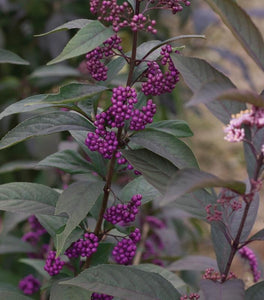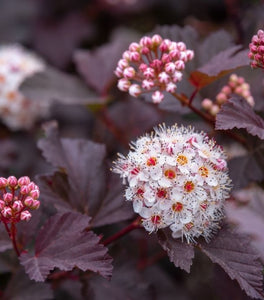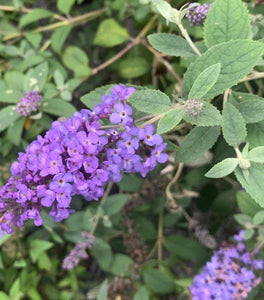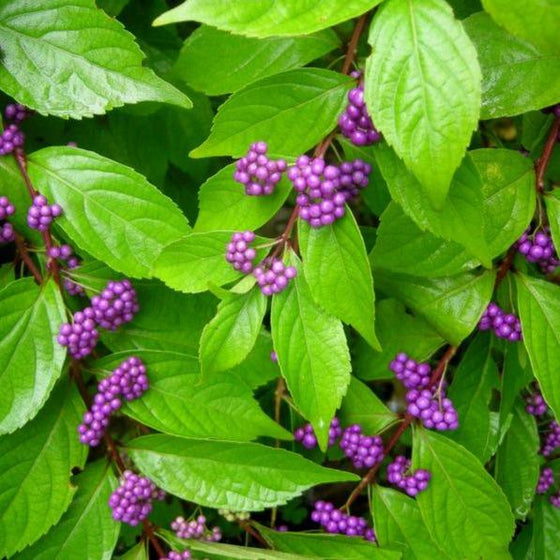
Images Depict Mature Plants
Early Amethyst Beautyberry Shrubs for Sale Online
Early Amethyst Beautyberry Shrubs (Callicarpa dichotoma) are a beacon for the fall border. This deciduous Korean species is considered by many to be the most refined Beautyberry, and its boldly-hued, early-September fruit occurs well before other varieties. Small and shiny, rounded berry clusters achieve an astonishing, almost electric-lavender hue. Flowers are a delicate pink color, quietly dressing up its handsome, very green leaf mass and gracefully rounded form.
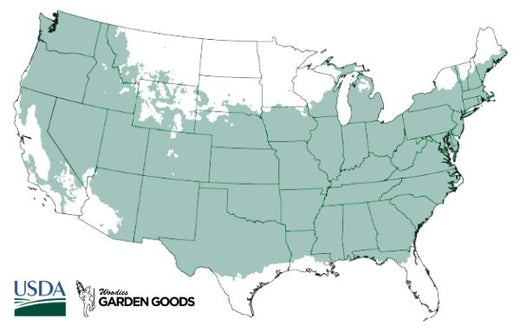
| Hardiness Zone: | 5-8 |
|---|---|
| Mature Height: | 4 to 5 Feet |
| Classifications: | Broad leaved deciduous shrub, late spring flowering |
| Sunlight: | Full sun to part sun |
| Habit: | Upright, rounded, densely branched |
| Flower Color: | White flowers in summer turning to purple fruit |
| Foliage: | Medium green turning yellow in the fall |
| Pruning Season: | Late winter to early spring, promotes increased branching and more flowers |
| Soil Condition: | Any well-drained soil |
| Water Requirements: | Water well until established |
| Uses: | Extremely attractive when used as a focal point in the mixed border, mass planting, or a specimen planting. Provides nectar sources for pollinators |
How to Care for Early Amethyst Beautyberry
After purchasing your Early Amethyst Beautyberry shrub, be sure to read our recommended care instructions to ensure a healthy and happy plant for years to come.
How do I water my Callicarpa Early Amethyst Beautyberry Shrubs?
After back filling and lightly compacting the 50/50 mix of existing soil and compost give the Callicarpa Early Amethyst a good, deep watering. This is not to be rushed. Most of the water you put on the plant at first will run away from the plant until the soil is soaked. A general rule of thumb is to count to 5 for every one gallon of pot size. For example, a one gallon pot would be watered until you count to 5; a three gallon pot would be 15; and so on. Check the plant daily for the first week or so and then every other day there after. Water using the counting method for the first few weeks.
How do I fertilize my Callicarpa Beautyberry Shrubs?
We always recommend Bio-Tone by espoma when first planting. Once established, Early Amethyst Beautyberry do amazingly well with a relaxed approach and grow best if they are fertilized once in the spring and once in the summer. Either chemical fertilizers or organic matter can be used successfully. Don’t fertilize Callicarpa Early Amethyst Beautyberry after August. Fertilizing at this time may stimulate new growth that will be too tender to withstand the winter.
How do I plant my Early Amethyst Beautyberry Shrubs?
We suggest when planting your newly purchased Callicarpa Early Amethyst Beautyberry Shrubs that you dig a hole twice as wide as the root system but not deeper. Depending on the quality of your existing soil, you may need to add a locally-sourced compost or topsoil to the backfill soil. We do not recommend using straight topsoil or compost as a backfill soil for Early Amethyst Purple Beautyberry because more times than not these products will retain entirely to much moisture and will cause the root system to rot. Adding compost or topsoil will help the young feeder roots of Early Amethyst Shrubs spread through the loose, nutrient-rich soil much easier than if you used solely the existing soil, which more times than not will be hard and compacted. The most common cause of plant death after transplanting is planting the new plant too deep. That is why we do not recommend planting in a hole any deeper than the soil line of the plant in the pot. A good rule is that you should still be able to see the soil the plant was grown in after back-filling the hole.
How do I mulch Amethyst Beautyberry Shrubs?
We highly recommend that you mulch your Early Amethyst with either a ground hardwood mulch or a ground cypress mulch depending on your local availability. Any type of mulch will do, but cypress or hardwood mulch will be of a higher quality and provide better nutrition overall as they breakdown. Mulching helps to keep weeds away that will compete with your new investment for water and nutrients. A 2 to 3-inch layer of mulch is sufficient, but remember to take care not to cover any part of the stem of the plant with mulch. It's better to leave a one-inch gap of space between the mulch and the stem or trunk of the plant.





